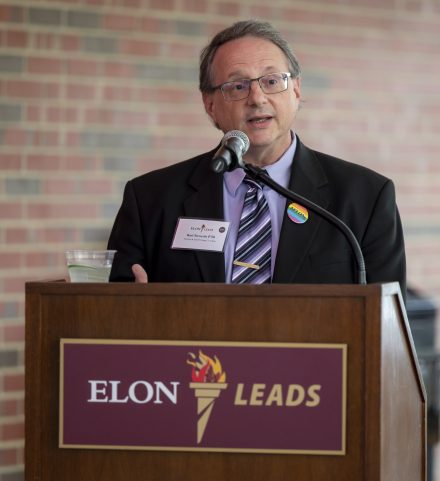Karl Sienerth, a chemistry professor at Elon, has been an influential committee member on the Elon Innovation Challenge for the past six years, serving as its chair each year.
Each year, The Doherty Center hosts the Elon Innovation Challenge (EIC), an innovation hackathon for students from Elon University and other schools to develop a solution for a real-world problem.
Karl Sienerth, professor of chemistry at Elon, has been an influential committee member on the Elon Innovation Challenge for the past six years, serving as its chair each year.

Sienerth has been a professor, mentor and scholar at Elon since 1998 when Elon was still known as Elon College. He enjoys teaching chemistry in several courses, such as sophomore seminar, an advanced course on chemical instrumentation, and chemistry lab. He’s become a sought-after mentor for chemistry students while also a helpful leader for ambitious, non-science majors.
What drew his connection to an entrepreneurial-based challenge? Sienerth credits Alyssa Martina, the director of the Doherty Center for Creativity, Innovation & Entrepreneurship.
In fall 2016, Sienerth was chair of the chemistry department, and Martina worked tirelessly to attract students from every discipline to get involved with innovation and entrepreneurship. Businesses and ideas require many perspectives and positions with various valuable skill sets are always required. In many cases, a scientist is also needed.
However, when asked what his biggest challenge as the Elon Innovation Challenge chairperson has been, Sienerth shared that it was his lack of experience in business and entrepreneurship. “When judging teams, I can offer thoughts on whether I think something is practical and useful, but I have no real basis to make hardcore judgments on marketing or funding models,” Sienerth said.
While he relies on other committee members to share their expertise on these matters, his experience and knowledge of chemistry are certainly put to use in many other ways in the challenge.
The annual competition has taken many different forms in the years since Sienerth has been chairing the event. The challenge introduces a new theme each year and in the past has covered important topics including the environment, mental health, creative entrepreneurship and recycling.
In 2021, the Elon Innovation Challenge focused on the universal experience of how the COVID-19 pandemic impacted small and mid-sized businesses with a longitudinal competition that focused on helping these companies survive during the pandemic. In other years, it’s been a weekend hackathon or an event occurring over a several-week period.
Projects generated through the Elon Innovation Challenge range have been able to accomplish a range of functions, from detecting date-rape drugs in beverages to minimizing waste in Elon’s waste stream, two that Sienerth notes are among his favorites.
The winning entry isn’t the primary focus of the competition but rather the teaching of design thinking and entrepreneurial skills to solve a unique problem.
“For me as a scientist, it’s a learning experience every year, seeing how the students tackle that year’s EIC theme and come up with amazing ideas with really fleshed-out marketing and execution strategies. Of course not every team makes a home run, but I am never not amazed by the creativity our students show,” Sienerth said.
The theme has yet to be announced for the upcoming Elon Innovation Challenge, but Sienerth did hint at a focus that would in some way be STEM-related.
“In order to celebrate the new Innovation Quad, the EIC theme this year will likely have a STEM flavor. But we don’t want that to turn off students who believe that science and math are just not their strong suits,” Sienerth said, ensuring that all Elon students will be encouraged to take part.
As Sienerth and Martina have emphasized, teams need various perspectives which all have a role in solving problems and developing a new venture. Teams that have a breadth of diverse majors and teammates represented are in the best position to develop a viable idea whether the theme is involved in STEM, the creative arts, or the environment.


